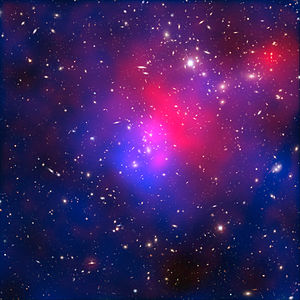Abell 2744
| Abell 2744 | |
|---|---|

Abell 2744, nicknamed Pandora's Cluster. The galaxies in the cluster make up less than five percent of its mass. The gas (around 20 percent) is so hot that it shines only in X-rays (coloured red in this image). The distribution of invisible dark matter (making up around 75 percent of the cluster's mass) is coloured here in blue.
|
|
| Observation data (Epoch J2000) | |
| Constellation(s) | Sculptor |
| Right ascension | 00h 14m 19.51s |
| Declination | −30° 23′ 19.18″ |
| Richness class | 3 |
| Bautz-Morgan classification | III |
| Redshift | 0.30800 |
| Distance (co-moving) |
1,221 Mpc (3,982 Mly) h−1 0.705 |
| X-ray flux | (5.805 ± 4.7%)×10−13erg s−1 cm−2 (0.1—2.4 keV) |
| Other designations | |
| Pandora's Cluster | |
| See also: Galaxy groups, Galaxy clusters, List of galaxy clusters | |
Abell 2744, nicknamed Pandora's Cluster, is a giant galaxy cluster resulting from the simultaneous pile-up of at least four separate, smaller galaxy clusters that took place over a span of 350 million years. The galaxies in the cluster make up less than five percent of its mass. The gas (around 20 percent) is so hot that it shines only in X-rays.Dark matter makes up around 75 percent of the cluster's mass.
This cluster also shows a radio halo along with several other Abell clusters. It has a strong central halo, along with an extended tail, which could either be relic radiation, or an extension of the central halo.
Renato Dupke, a member of the team that discovered the Cluster, explained the origin of the name in an interview: “We nicknamed it ‘Pandora's Cluster’ because so many different and strange phenomena were unleashed by the collision.”
Giant galaxy cluster Abell 2744 observed as part of the Frontier Fields programme.
The galaxies that are not coloured blue are either in the foreground or background and are not part of the cluster.
Abell 2744 galaxy cluster - Hubble Frontier Fields view (7 January 2014).
Abell 2744 galaxy cluster - extremely distant galaxies revealed by gravitational lensing (16 October 2014).
Coordinates: ![]() 00h 14m 19.51s, −30° 23′ 19.18″
00h 14m 19.51s, −30° 23′ 19.18″
...
Wikipedia
